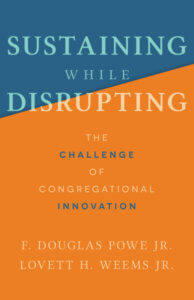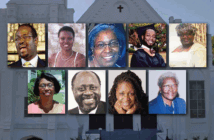What is God calling your church to do in the near future given your church’s mission and context? Doug Powe and Lovett Weems outline key considerations for leaders who seek to innovate while also sustaining what is most essential in their ministries.
Practicing innovative leadership is a necessity for all who care deeply about the faithful and fruitful stewardship of your congregation’s mission. Maintaining “what is” is never sufficient, and the more the church and community are changing, the more attuned leaders must be to those changes and their implications for the church. Matt Miofsky and Jason Byassee captured the challenge well in Eight Virtues of Rapidly Growing Churches when they wrote, “In our churches, we often overestimate the cost of trying something new and underestimate the cost of doing nothing.”
Three leadership imperatives
Your attention must be focused on three things as you plan your own priorities and work with congregational leaders and staff to set congregational priorities:
- the basics on which all else depends
- the sustaining efforts most critical to the organization’s ongoing mission and fruitfulness
- the efforts for innovation most critical for the church’s next faithful step
Choosing key change priorities
In addition to caring for the basics and practicing good management to improve what you are already doing well, vital congregations identify a few initiatives that can take the church into a new chapter in its history. We suggest that the following criteria are useful in identifying priorities:
- Potential: What difference will it make?
- Fit: How will it align with our identity and values?
- Reach: How will it help us reach unserved or underserved people?
- Readiness: Is the issue “ripe” enough to engage, or can we “ripen” the issue?
Think of looking into a kaleidoscope. Each of the four criteria represents a different turn of the eyepiece. The elements inside the kaleidoscope stay the same, but you see a new image with each turn. Each criterion gives you a chance to see fresh possibilities. Once the priority is determined, you are ready for the next steps.
Determining what God is calling you to do
Leadership for something you are not currently doing or not doing well is different from making incremental management improvements — making changes you identify through your experience. Efforts you are not doing or not doing well require new construction, not renovation. You first must decide what change you believe God is calling the congregation to make.
Farmers do not know what to do until they decide what crops they hope to harvest. Builders cannot begin until the nature of the structure is determined. So it is with the most spiritual of ministry endeavors. You must determine what fruit you hope God will provide from the harvest of your efforts.
Exploring what you need to learn
Next is learning — and resisting the temptation to begin doing things. You don’t know enough to do things yet. Remember, Ronald Heifetz says an “adaptive challenge” is one that requires you to learn before you can act.
As you learn, you will continue to confirm or revise your ultimate outcome, even as you begin to think of initial steps that will help you test out the assumptions behind your thinking as well as other critical aspects of the effort. Each of the initial steps leads to evaluation, learning, and subsequent next steps based on what you have discovered. With each step, you are growing wiser and more focused on what you still need to learn. Some of your ideas may fall away as a result of your testing, but others will arise. Those working as a team should gain energy and confidence from their growing knowledge and experience.
The need for new knowledge and skills
The decline of participation in mainline and other congregations is not news. Mainline denominations have been working to reverse negative trends for years. We believe change requires a new way of thinking. The knowledge and skills a pastor needed in past decades are not irrelevant, but now they have to expand. The new competency requires sustaining and innovating leadership practiced well and at the same time.
Wise leaders consider how much time and effort they put into sustaining leadership — building on the strengths of the congregation and minimizing its weaknesses. They also recognize that they cannot rely on sustaining leadership alone to help God’s people take the next faithful step, given new and ever-changing cultural and social contexts. They also need to practice innovative leadership. This both/and approach requires new knowledge and new skills.
This article is excerpted from Sustaining While Disrupting: The Challenge of Congregational Innovation by F. Douglas Powe Jr. and Lovett H. Weems Jr. (Fortress Press, 2022). Used by permission. The book is also available at Cokesbury and Amazon.
Related Resources
- Sustaining While Disrupting by Doug Powe and Lovett Weems — Podcast episode | Podcast video | In-depth interview
- Genuine Change Involves Continuity by Doug Powe and Lovett Weems
- 7 Key Questions to Focus Your Change Agenda by Doug Powe and Lovett Weems
If you would like to share this article in your newsletter or other publication, please review our reprint guidelines.







